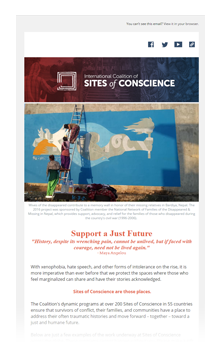ON THE BRINK: ACCOUNTABILITY AND JUSTICE IN YEMEN
In the past decade, countries in the Middle East and North Africa (MENA) have experienced tremendous political upheaval and, in many cases, brutal conflict. To assist these countries as they emerge from these violent situations, the Global Initiative for Justice, Truth and Reconciliation (GIJTR) at the International Coalition of Sites of Conscience has implemented a variety of truth-telling, community reconciliation and local justice programs to respond to grassroots needs in MENA, filling the gaps left by the limited timeframes and scope of formal transitional justice and judicial mechanisms. As a product of this effort, GIJTR has built a transitional justice community of local populations, practitioners and policy makers in the region that share ground-breaking models, emphasize peer learning, and place local communities at the center of their projects.
To this end, GIJTR is pleased to launch a monthly video series – generously supported by the International Research & Exchanges Board (IREX) – featuring practitioners throughout the MENA region and international experts discussing key components and challenges of transitional justice.
This month features Adbul Hakim, acting director at Partners Yemen. In conflict since 2014, Yemen is the most impoverished country in the Arab world, with two-thirds of the population – over 17 million people – in dire need of food and humanitarian aid. In September 2017, Zeid Ra‘ad al-Hussein, the UN human rights chief, said there had been only “minimal” efforts to hold perpetrators accountable in what the United Nations has branded the world’s worst humanitarian crisis.
For more information about the Global Initiative for Justice Truth and Reconciliation, please contact Ereshnee Naidu, Senior Director, Global Transitional Justice Initiative, at enaidu@sitesofconscience.

